Kristina Groves, athlete-dreamer-workhorse
Hear the latest podcast with this Kickass CanadianRecorded: December 16, 2013
“I learned how to train hard and I think that’s ultimately what led to me being successful.”
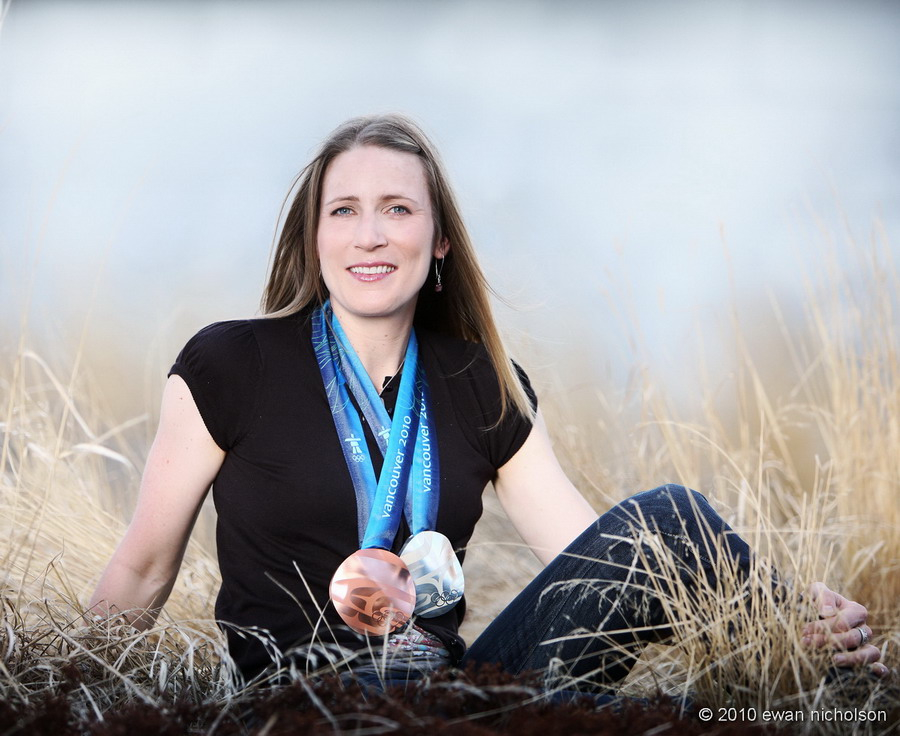
Ewan Nicholson Photography
Kristina Groves is really into mountain biking. That doesn’t mean she’s about to tackle the event at the 2012 Olympic Games. It simply means she loves the sport and intends to get out on the trails around her Calgary, Alberta home as often as possible.
Since officially announcing her retirement from competitive speed skating in September 2011, Kristina has been exploring other sports, including mountain biking and telemark skiing. But she wants to be very clear: they’re all purely recreational. “Everyone keeps asking me if I’m going to race mountain bikes,” she says. “I tell them, ‘No. I just really like mountain biking.’”
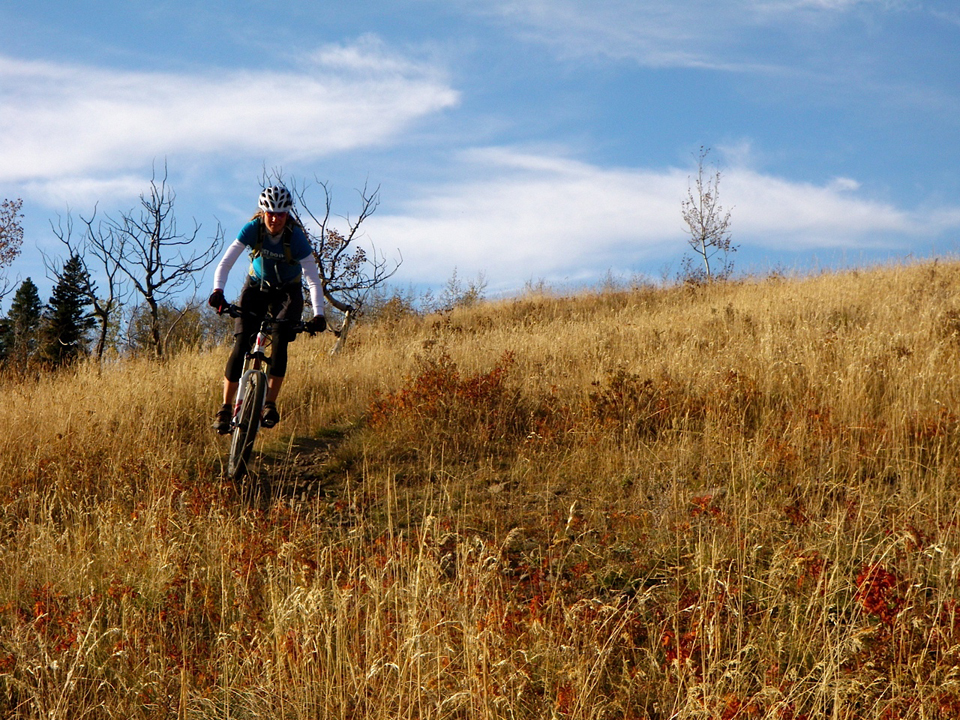
Mountain biking in Bragg Creek, Alberta, October 2011
The idea that Kristina might be biking “just for fun” seems alien to those who know her. After all, she’s the girl whose unwavering drive and dedication allowed her to overcome a “lack of talent” for speed skating and become one of the greatest names in the sport, with 35 World Cup medals (18 of them gold) and four Olympic medals under her belt.
In her 23-year career, she’s been on the podium an astounding number of times. Her most memorable competition was the 2008 World Single Distance Championships in Nagano, Japan, where she became World Champion in the 3,000m and the only female skater to ever medal in five separate events (1,000m, 1,500m, 3,000m, 5,000m and Team Pursuit) at that competition.
With such an impressive track record, it’s no wonder Kristina has inspired boatloads of young Canadian athletes, including the one who recommended her for this website. Jillian Gilday, a former speed skater and proud youth ambassador for impossible2Possible (co-founded by Kickass Canadian Ray Zahab), met Kristina while training at Calgary’s Olympic Oval. “She is an inspiration not only to young girls across Canada who are pursuing sport, but to anyone who wants to make a difference in the world,” says Jill. “She embodies hard work and dedication to everything she does.”
That solid-gold work ethic is something Kristina had in spades, even as a young girl. She also had something else: the ability to dream.
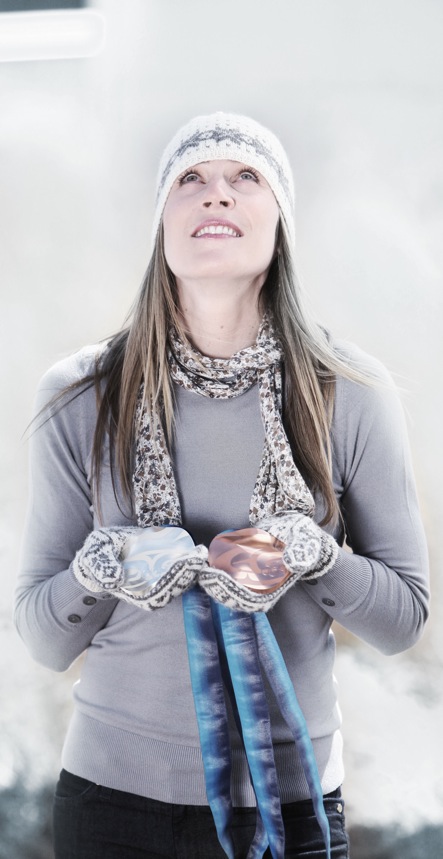
Ewan Nicholson Photography
Defining moments
In autumn 1987, the Groves family stopped at a Petro Canada gas station in Ottawa, Ontario on their way home from the cottage. Kristina was only 11, but she was about to make a discovery that would set the course of her life for the next 23 years. From the back of the car, she caught a glimpse of a poster advertising the Olympic torch relay for the upcoming 1988 Winter Games.
“I thought, ‘That would be fun,’” she says. “So I ran into the Petro Canada and I filled out one of those ballots and dropped it off in the box. I was absolutely convinced, 100%, that I would be chosen to run with the torch.”
Kristina never carried the torch. But she did go on to carry the Olympic dream—for herself and countless Canadians—for many years to come. Seeing that poster at the gas station lit the flame in her determined heart; watching Canadian Gaétan Boucher compete in the 1,500m event “totally spurred me on to want to try speed skating.”
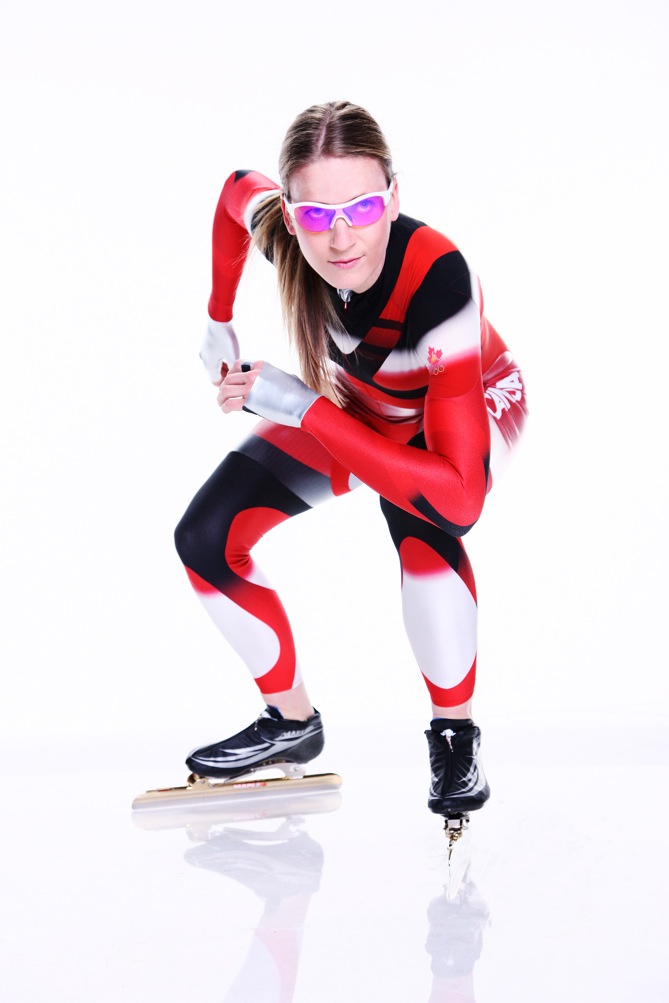
Ewan Nicholson Photography
Defining commitment
Being the focused, spirited child she was, Kristina did try speed skating. By all accounts, she wasn’t very good at the beginning. In her words, she “sucked.” But, she says, “I learned how to train hard and I think that’s ultimately what led to me being successful.”
As Kristina tells it, her success was a slow, steady burn. She set goals, put her nose to the grindstone and kept working until those goals were met. Then, she’d set a higher goal. She didn’t win a race until 1991—at the North American age class championships in Lake Placid, New York—but that never deterred her from staying the course.
After graduating from Ottawa’s Brookfield High School in 1995, she made the move to Calgary to train at the Olympic Oval. She enrolled in the University of Calgary’s Kinesiology program, which she fit in when she could, eventually graduating in 2004, and set about carrying out her dream of making it to the Olympics.
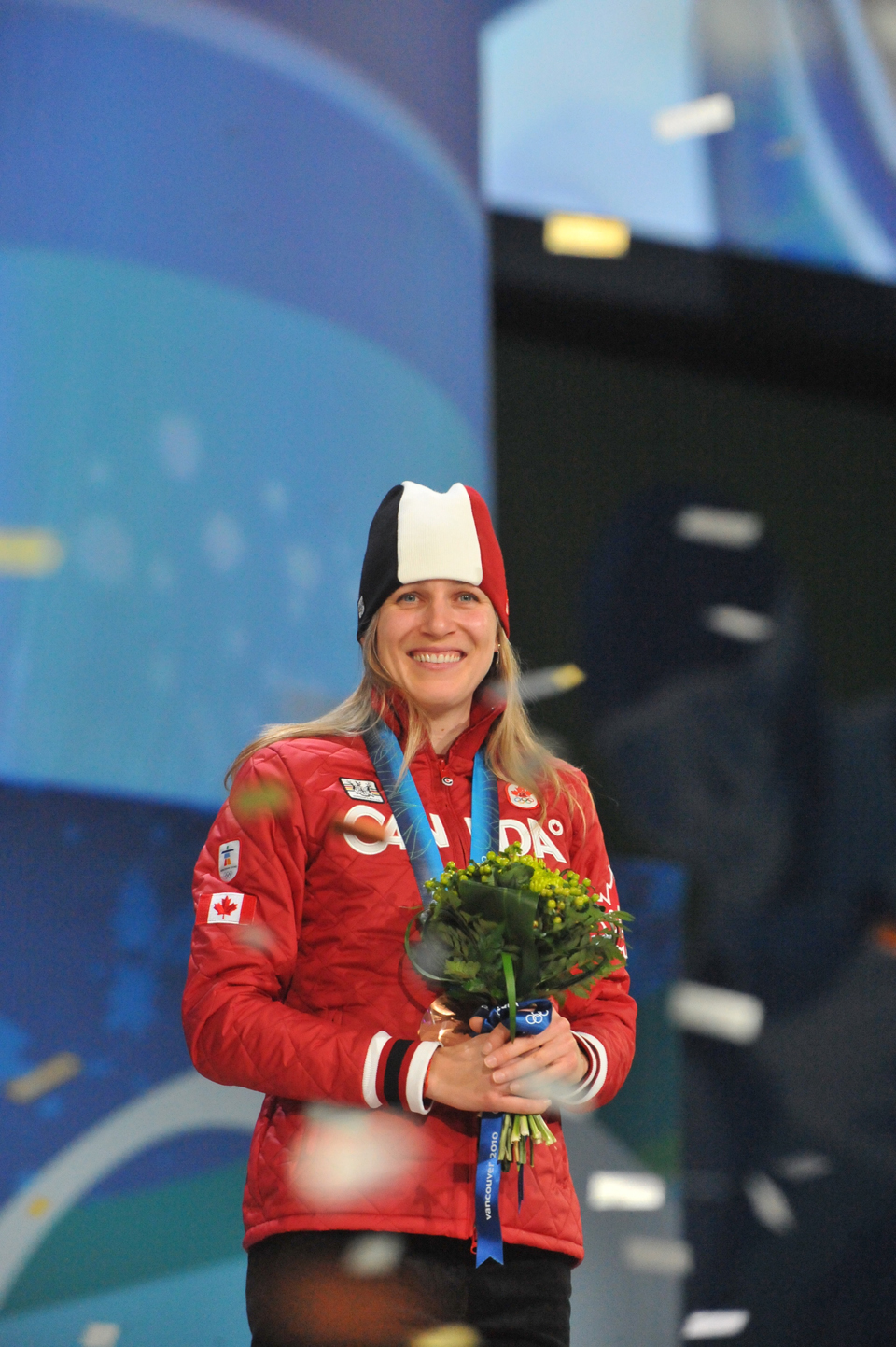
Receiving the Olympic bronze medal for the 3,000m skate, Vancouver 2010 (Les Baszo Photography)
Defining success
At first, Kristina’s goal-oriented approached served her very well. “Everything was about what team I wanted to make or how I wanted to place,” she says. “I would finish a race and I would wait until everyone else skated, and then I would look at the number beside my name and if it was within my goal range, I’d be happy.”
When she finished fourth overall at the 2003 World All-Round Championships—making a huge leap from her 11th place finish the year before—she set her sights on coming in third in 2004. It was a logical goal to set; to date, her efforts had resulted in a gradual but consistent climb in the rankings. Then the 2004 World All-Round Championships rolled around and she finished a disappointing 17th overall.
“It threw my whole goal-setting system out of whack,” she says. “How could I go from 4th to 17th?”
That competition prompted Kristina to reexamine her outlook on skating. In the end, she realized that the best way to pursue winning was to not pursue it at all. “You always want to win; winning is the ultimate in sport,” she says. “But if you’re only focused on winning, you worry about things you can’t control, like how fast other people are going to skate. The only thing you’re in control of is being on the start line and how fast you can make your body go.”
She and her coach Xiuli Wang worked hard on tuning out distractions, like rankings and competing times, and focused only on what mattered: how she skated. Xiuli helped identify what factors were at play during Kristina’s best performances and taught her young athlete how to recreate those circumstances at every race.
By the time the 2004 World Cup season got started, Kristina was in a completely new headspace. Rather than focusing on the results, she thought only about what she needed to do during her races. That new approach led to her first World Cup medal—a gold in the 3,000m—and marked the difference between waiting to feel good about a race until after the final results, and “being able to cross the finish line and know instantly whether or not it was a good race (for me), regardless of how other people did,” she says.
It was a pivotal moment for the athlete, not only because it proved to everyone that she was capable of winning at an international level, but also that her reward now came from something she could control, something within her—the knowledge that she had done her very best in any given race. “(In winning that medal), I realized that I could win and that I didn’t actually give a crap about winning,” she says.
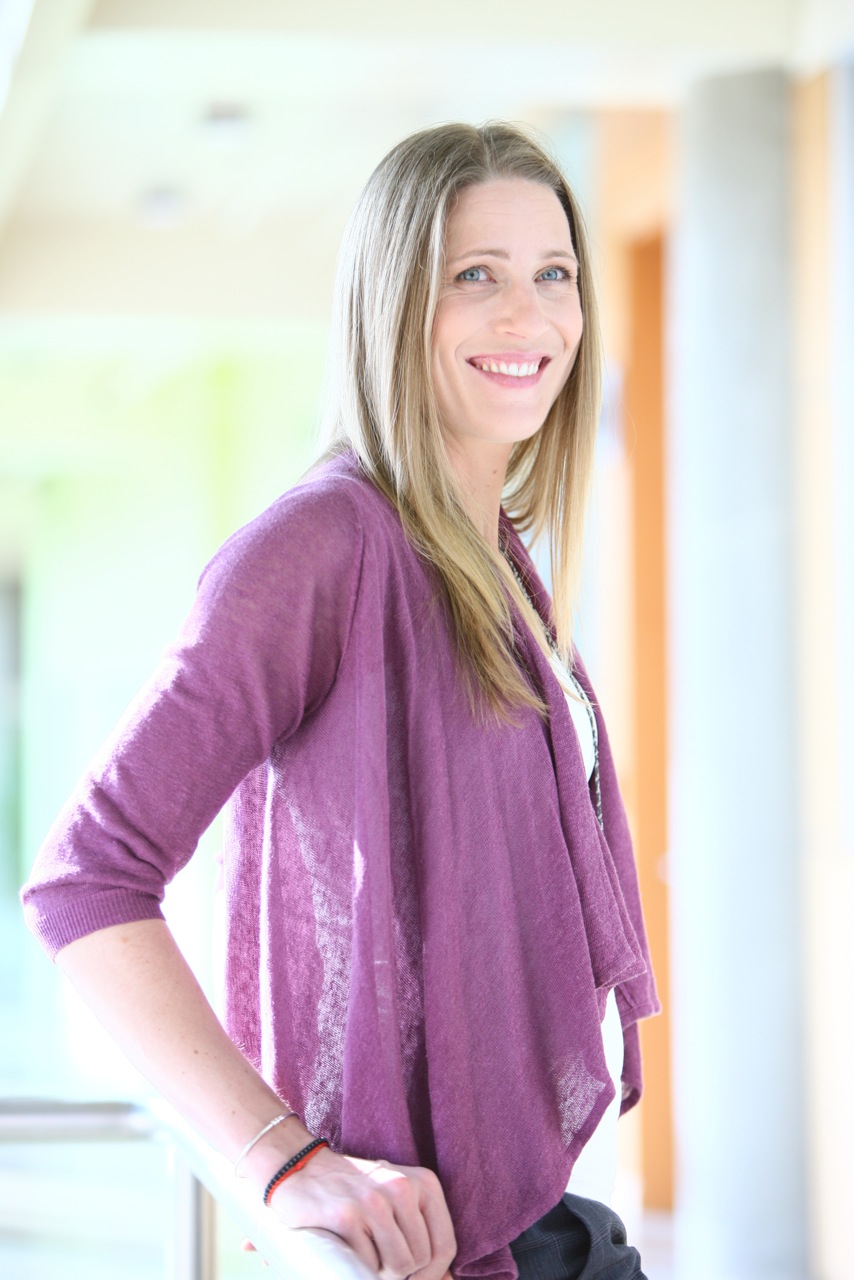
Ewan Nicholson Photography
Defining rights
Kristina’s World Cup medal in 2004 became the first of an eventual 35 she would go on to win. Her accomplishments on the podium are huge, and she’s deservedly proud of them. But what she’s most proud of is her work with a host of non-profit organizations that are committed to making the world a better place. She’s actively involved with many athletics and environmental organizations, including Right to Play, KidSport, Clean Air Champions and Green Calgary.
“The things I hope people take away (from my career) are the less quantitative aspects of how I went about being an athlete, in terms of getting involved with organizations that I really care about,” she says. “Sharing and using the results I’ve achieved to help a bigger cause—something bigger than myself.”
Right to Play in particular holds a special place in Kristina’s heart. For years, she sported the organization’s logo on her uniform free of charge, and even turned down a generous sponsorship for the 2010 Olympic Games in Vancouver because she wasn’t willing to offer up Right to Play’s logo spot.
“I think every athlete understands Right to Play because we appreciate the impact that play and sport have had in our own lives, and how much of a privilege it is to be able to do that,” she says. “I went to Rwanda with Right to Play, and those kids didn’t have anything. It makes you appreciate that being human isn’t just about having a beating heart and being physically alive; you need something in your life that gives you joy, and when I look at Right to Play, I feel like that’s what it’s doing for kids around the world.”
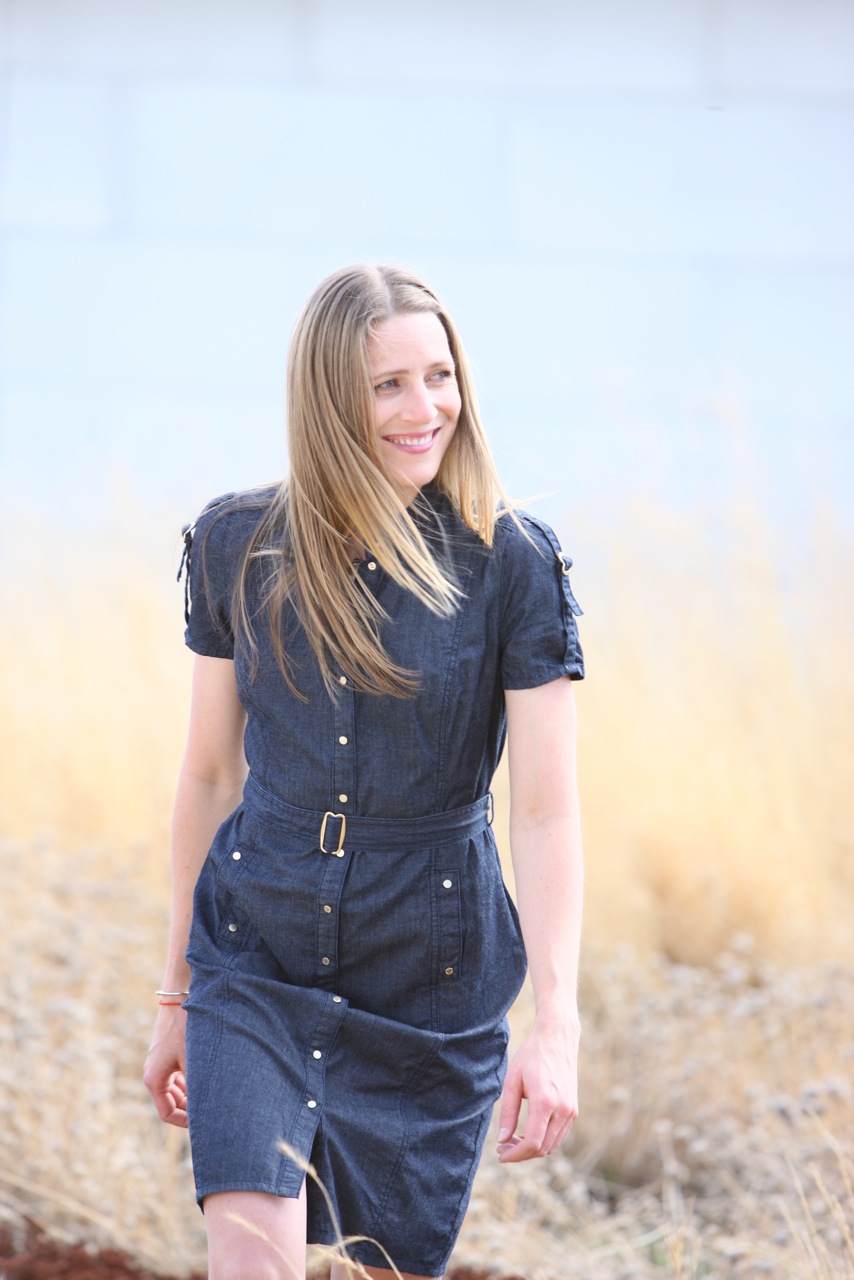
Ewan Nicholson Photography
Defining sportsmanship
On her blog, Kristina wrote the following about her decision to retire:
“I’m not retiring because I don’t love speed skating or can’t fathom doing the work or can’t skate fast anymore, it’s simply because I feel fulfilled by what I’ve accomplished and am no longer inspired to strive for the same thing; my heart is full.”
Her heart may be full as far as racing goes, but for someone with as much heart as Kristina, there’s plenty of room for other things. For starters, she’s looking forward to spending more time volunteering for Right to Play. She’s stretching her public speaking muscles, with upcoming gigs for organizations such as Own the Podium and Green Calgary. She’ll be commentating for the CBC, blogging for the Canadian Olympic Committee (COC) and expanding her own blog at kristinagroves.ca. Oh, and she’s toying with the idea of writing a book that will offer “a lighthearted glimpse of what it’s like to be an athlete.”
She will also—always—make time for sport. It’s been nearly a year since she last skated; she was concussed after a fall in the Team Pursuit race at a World Cup in Berlin last November (an incident, she makes clear, that had nothing to do with her retirement), and spent nearly eight months recuperating and getting back to her preferred level of activity—frequent and intense. These days, she’s able to enjoy vigorous exercise with family, friends and former teammates, and has no intention of ever giving that up. She’s even planning to return to skating “for fun” at the Oval when the time comes.
“I see (my retirement) as retiring from competition, not from speed skating,” she says. “I’ll always be involved in some way, whether it’s coaching or announcing, doing talks for the younger athletes. Any way I can give back. And I’ll still skate once in awhile. I just retired from racing. I still love skating; I guess I just look at it as changing the way I’m a part of the sport.”
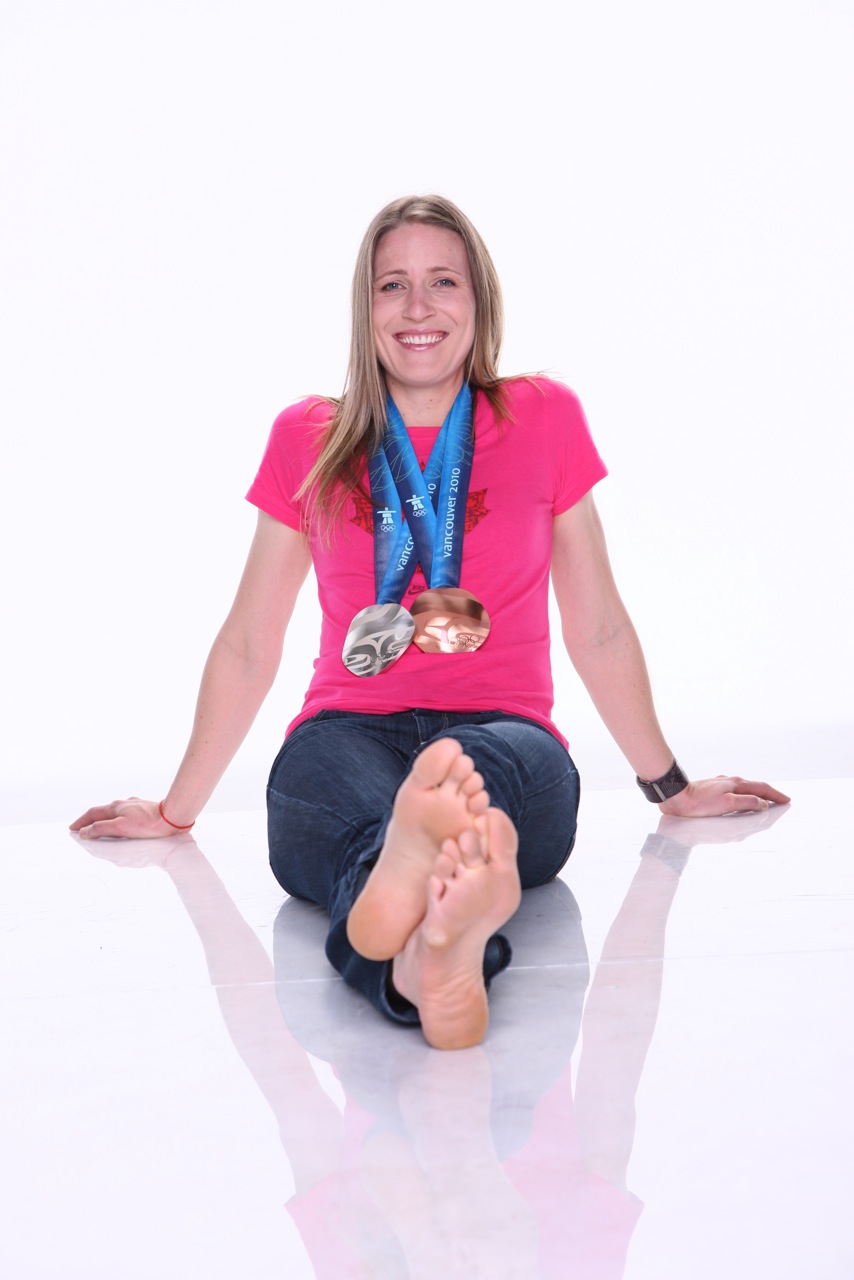
Ewan Nicholson Photography
Defining excellence
One of the things Kristina is enjoying most about her retirement from competition is the fact that she’s not constantly on the clock. Being an athlete, she says, is a 24-7 job. “You never stop thinking about racing and the consequences of every action you take. You’re constantly making some kind of sacrifice.”
She’s still dedicated to being the best she can be. It’s just that now her focus isn’t on something as all consuming as being a professional, Olympic-level athlete.
“Until this point, my life has been about some future, distant goal,” she says. “It was always about the Olympics and speed skating, and now that that’s gone, I feel like I’m enjoying what I do on a daily basis a bit more. Right now my journey is simply seeing what comes my way, pursing things that I’m interested in and doing them really, really well. It’s like little bits of excellence as opposed to trying to make my entire existence about being excellent at one thing. For now, I’m going to do a really good job at (my upcoming speaking engagements), and that’s that.
“Then I’m going to go for a sweet mountain bike ride.”
* * *
To (try to) keep up with Kristina, visit kristinagroves.ca and follow @kngrover on Twitter.
 Kickass Canadians
Kickass Canadians
Hey Kristina, great article. Thanks for being such an amazing Canadian and ambassador for sport. Congrats on an amazing career….norm
A proven gold medal athlete regardless of official results… One of Canada’s best ever in speed skating and mountain biking.
Well said, Wayne!